| Srl | Item |
| 1 |
ID:
119965
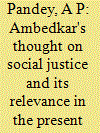

|
|
|
| 2 |
ID:
118975
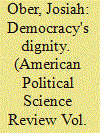

|
|
|
|
|
| Publication |
2012.
|
| Summary/Abstract |
Dignity, as equal high standing characterized by nonhumiliation and noninfantilization, is democracy's third core value. Along with liberty and equality, it is a necessary condition for collective self-governance. Dignity enables robust exercise of liberty and equality while resisting both neglectful libertarianism and paternalistic egalitarianism. The civic dignity required for democracy is specified through a taxonomy of incompletely and fully moralized forms of dignity. Distinctive features of different regimes of dignity are modeled by simple games and illustrated by historical case studies. Unlike traditional meritocracy and universal human dignity, a civic dignity regime is theoretically stable in a population of self-interested social agents. It is real-world stable because citizens are predictably well motivated to defend those threatened with indignity and because they have resources for effective collective action against threats to dignity. Meritocracy and civic dignity are not inherently liberal, but may persist within a liberal democracy committed to universal human dignity.
|
|
|
|
|
|
|
|
|
|
|
|
|
|
|
|
| 3 |
ID:
142425


|
|
|
|
|
| Summary/Abstract |
This article argues that the concept of human dignity is better understood as an essentially contested concept. Following Walter Bryce Gallie's original definition of essential contestability in 1956 and the subsequent additions made by several authors over the years, it argues that describing human dignity in such terms helps to explain not only the theoretical disagreements about the concept, but also its current place within the international legal regime. The essentially contested concept framework is therefore not only accurate in describing the global phenomenon of human dignity (the latter fulfilling the seven criteria set out by Gallie regarding this framework), but also useful in doing so. The article concludes that for human dignity to properly perform its supposed function, it needs to become ‘decontested’, something that can only happen following the recognition of its theoretical structure.
|
|
|
|
|
|
|
|
|
|
|
|
|
|
|
|
| 4 |
ID:
122442


|
|
|
|
|
| Publication |
2013.
|
| Summary/Abstract |
India is an ancient civilisation. The concepts of 'human dignity'
and 'tolerance' are intrinsic to the Indian thought. 'Dharma' is a
distinctive concept which personifies recognition of dignified human
interaction. Indian notions of 'Vasudev Kutumbakum' (universal
brotherhood) and 'Sarvebhavantusukhinam' (may all be happy)
exemplifies the cultural orientation of the society at large towards
common wellbeing of the human race!
|
|
|
|
|
|
|
|
|
|
|
|
|
|
|
|
| 5 |
ID:
179375
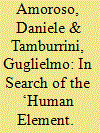

|
|
|
|
|
| Summary/Abstract |
The ‘weaponisation’ of artificial intelligence and robotics, especially their convergence in autonomous weapons systems (AWS), is a matter of international concern. Debates on AWS have revolved around (i) the identification of hallmarks of AWS with respect to other weapons; (ii) what it is that makes AWS destructive force especially troublesome from a normative standpoint; and (iii) steps the international community can take to allay these concerns. Of particular concern is the need to preserve the ‘human element’ in the use of force. A differentiated approach to this latter issue, which is also principled and prudential, may pave the way to a legally binding instrument to regulate AWS by establishing meaningful human control over all weapons systems.
|
|
|
|
|
|
|
|
|
|
|
|
|
|
|
|
| 6 |
ID:
073743


|
|
|
| 7 |
ID:
084849
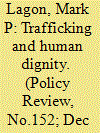

|
|
|
| 8 |
ID:
133028
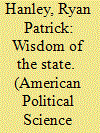

|
|
|
|
|
| Publication |
2014.
|
| Summary/Abstract |
Adam Smith's engagement with China and Tartary is a central yet underappreciated element of his economic and political thought. This article reconstructs this engagement and demonstrates its broader significance, arguing that it focuses on three themes: the economic institutions that promote domestic growth in a manner that alleviates the material conditions of the poorest, the social and political conditions that minimize the dependence of the poor on the wealthy, and the ethical values and civic institutions that guarantee the existential survival of the state. This treatment is significant for three reasons: It offers useful insight into the contested issue of Smith's conception of legitimate state action; it clarifies Smith's vision of a commercial order that promotes human dignity; and it reveals the depth of his participation in a specific contextual debate.
|
|
|
|
|
|
|
|
|
|
|
|
|
|
|
|